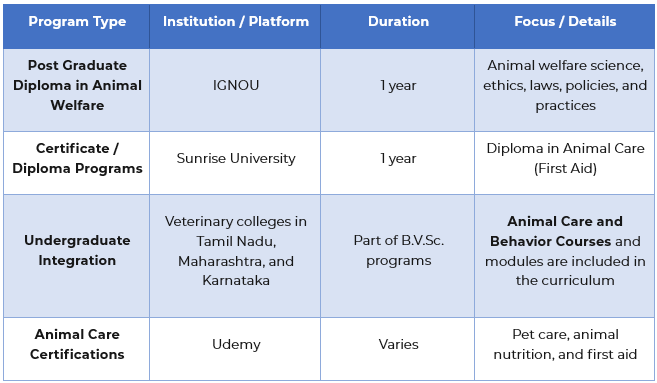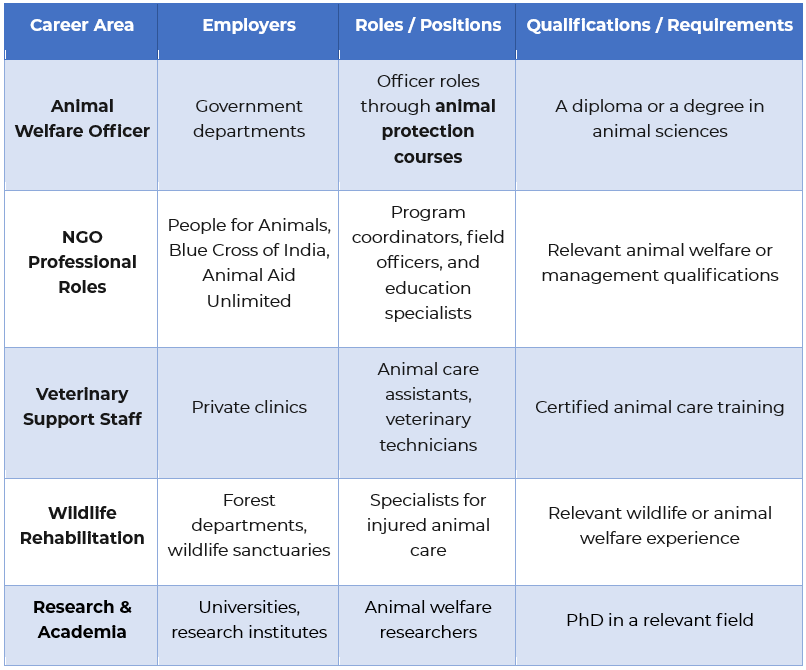The Prevention of Cruelty to Animals Act 1960 was the first law that set up a full-bodied legal protection of animals in India. This model has gained numerous registered animal welfare organisations in the country. The Animal Welfare Board of India has been contributing about ₹450.42 lakh in financial support to recognised Animal Welfare Organisations in the financial year 2023 – 24, which is used in rescue operations, shelter maintenance, and ambulances for animals. The developments have increased the educational courses and career opportunities, establishing organized opportunities for people in animal-related professions in the country.
Understanding Animal Welfare in India
In India, animal welfare is a subject that has a set of legal requirements and institutional structures that outline the professional role and career demands. Government agencies, NGOs, and commercial organisation professionals have standardised certification requirements in the field.
- Laws: Prevention of Cruelty to Animals Act of 1960 provides a punishment of up to 50 rupees in the case of first-time offenses and 100 rupees in case of recurrence. Also, the Wildlife Protection Act, 1972, establishes penalties for cruelty, poaching, and illegal trade in wild animals, and stipulates stiffer penalties for offences against the endangered species.
- AWBI Authority: Animal Welfare Board of India (AWBI), a statutory organization, is an organization established under the Prevention of Cruelty to Animals Act, 1960. It provides advice to the government on animal welfare legislation, liaises with State Animal Welfare Boards, and offers animal welfare training courses for professionals.
- Professional Standards: The state veterinary councils apply licensing conducts for animal care practitioners, but the Bureau of Indian Standards publishes guides on animal handling in commercial establishments.
- Enforcement Mechanisms: The cruelty to animals can be criminally punished in accordance with Sections 428 and 429 of the Indian Penal Code that penalise mutilation or killing of animals. Lodged complaints are responded to with the normal work of policing and with the assistance of different animal welfare units.
Educational Pathways in Animal Welfare
To address the increasing need for vet professionals, India offers organized educational courses related to animal care in universities, distance learning institutions, and online courses. The programs are 6-month certificate programs up to 2-year postgraduate degrees.

Career Opportunities in Animal Welfare
Proficient animal protection and care professionals are actively hired by the state organizations, non-profit organizations, and private institutions. The industry presents entry-level jobs, which have promotion opportunities to top management jobs.

Training and Certification Programs
Professional certification standards help in maintaining competent workers to the standards of the animal handling and welfare assessment industry. Most state veterinary councils and AWBI often offer required hours of training and recertification to licensed individuals in every field.
- Special certifications: The certification of animal care in wildlife rehab, laboratory animal care and livestock handling demands special training hours and examinations that need to be passed.
- Professional Development Courses: Animal welfare officer courses in schools like the Indian Veterinary Research Institute involve practical training in the course.
- AWBI Honorary Representative Training: The board offers voluntary training to individuals wishing to do grassroots animal welfare work with certificates lasting 3 years.
- Online Professional Programs: Certificate in animal welfare programs in accredited institutions are also provided on a remote learning platform with practical examinations at specific centres.
- Continuing Education: Certified professionals are required to fulfill an annual number of training hours to be certified, and the course updates of an animal welfare officer should be made every two years.
Challenges and Professional Considerations
The animal welfare experts face specific issues at work, which require training and career development.
- Emotional Demands: Cases of animal suffering require one to be psychologically resilient, and the services of professional counselling are available through employer assistance programs.
- Physical Requirements: Animal handling involves physical risks, such as bites, scratches, and exposure to zoonotic diseases, and necessitates safety training and use of protective equipment.
- Resource Limitations: NGOs and government agencies have budget constraints, which restrict the availability of equipment and program growth, which impacts the capacity to deliver services.
- Legal Complexities: The laws governing animal welfare necessitate continuous training on the standards of procedures, the collection of evidence, and court witnessing.
- Career Advancement: There are a few senior job opportunities that need supplementary qualifications and specialised training to achieve professional growth and a salary increment.
Conclusion
The animal welfare business in India presents a growing career because of the improved legal systems and increased awareness. Government posts, NGO jobs, and opportunities as a private practice animal welfare lawyer in India all require animal welfare courses. The combination of formal training in animal care courses in India and hands-on experience and constant skill improvement is what professional success requires. These courses in animal care and behaviour are designed to prepare the course holders for specialist roles in wildlife rehabilitation, companion animal care, and livestock welfare assessment.
Are you interested in animal welfare careers and animal care certificates online? Explore Mindler’s career assessment tools to see how your skills and interests align with this field.
Frequently Asked Questions
- What qualifications are needed to become an Animal Welfare Officer in India?
An animal welfare officer qualification would need a diploma or an animal welfare degree online in veterinary sciences, animal husbandry, related areas programmes, or certification by AWBI or other approved training facilities. A further completion of the civil service examination may be necessary for government jobs.
- Are there online courses available for animal care in India?
The distance training programs offered in Udemy, TANUVAS, and Coursera offer online animal care courses. The courses offer an online animal welfare degree that is flexible and has remote examination capabilities.
- How can someone start volunteering in animal welfare in India?
Get in touch with local animal shelters, animal non-governmental organisations, such as the Blue Cross of India, or conservation organisations that deal with wildlife. The majority will take in volunteers to do daily care activities, rescue missions, and community education programs and will not require experience.
- What are the career prospects in animal welfare in India?
The career opportunities are also found in government, non-governmental organizations, veterinary hospitals, animal reservations, and research centers. The entry-level positions can be promoted to senior management positions where the professionals can be charged with an increasing amount of responsibility.
- Is financial support available for animal welfare education in India?
Scholarships to animal welfare degrees are offered in some institutions and educational loans are offered through government schemes. In others, NGOs can fund their potential candidates in specialisation and certification training programs.








